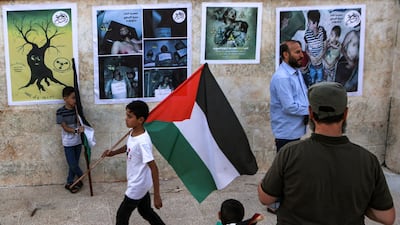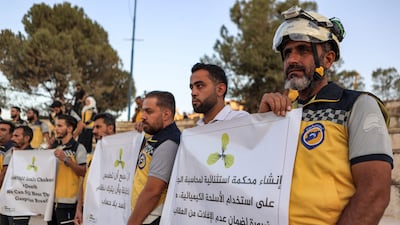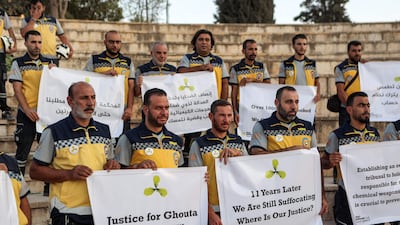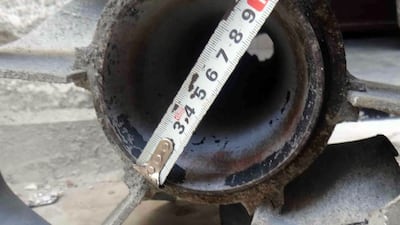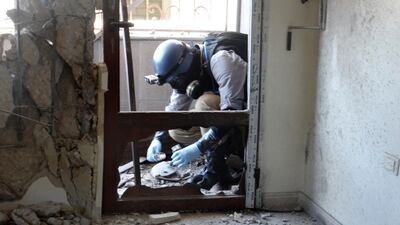Eleven years after a chemical weapons attack killed hundreds in his home region of Ghouta, near Damascus, Syrian surgeon Selim Namour refuses to give up the fight to bring those responsible to justice.
In the early hours of August 21, 2013, two years into Syria’s civil war, rockets loaded with sarin rained down on Ghouta's eastern districts of Ein Tarma and Zamalka and the Moadamiyah district in the west.
Dr Namour, speaking to The National from Germany, where he now lives in exile, recalled being summoned to the Kahf Hospital where he worked to respond to a case of mass asphyxiation.
There were already dozens of bodies lying at the hospital when he arrived. Among them was a little girl who spoke to him. “I am alive ammo [uncle],” he recalled her saying.
“Some who arrived alive responded to treatment. But death was in control,” he said.
The Unified Ghouta Medical Office, which Dr Namour headed at the time, recorded 1,466 deaths in Eastern Ghouta and 100 deaths in Western Ghouta. More than 10,000 people were treated for symptoms.
An investigation overseen by the UN failed to assign responsibility for the attack on what was then a rebel-held area. The Syrian government has denied any responsibility.

Ghouta was eventually retaken by government forces in 2018 under a surrender deal brokered by Russia, which had entered the conflict three years earlier in support of President Bashar Al Assad.
Dr Namour was among the civilians who left the area and were taken by bus to northern Syria under the deal. He took with him a wealth of data on the deadliest large-scale use of chemical weapons against civilians since Saddam Hussein’s forces gassed the Iraqi Kurdish city of Halabja a quarter of a century before.
In 2022, he and other medics who witnessed the attack, as well as survivors and relatives of victims of the chemical weapons attacks in Ghouta and other parts of Syria, founded the Association of Victims of Chemical Weapons (AVCW) to seek accountability.
They scored what Dr Namour regards as a small victory when their testimony led French judges to issue arrests warrants last year for Mr Al Assad, his brother Maher, and two of his generals, for complicity in war crimes and crimes against humanity over the 2013 Ghouta gassing.
But Dr Namour insists the search for justice must continue. “I feel we have let the people down. The criminal is still free,” he said.
“The regime is complicit in the use of chemical weapons against the Syrian people, but until now there has been no serious steps towards accountability.”
Syrian doctor from Ghouta
He said the world “has been hiding behind the Russian vetoes”, referring to numerous vetoes by Moscow at the United Nations Security Council, which effectively killed UN efforts to investigate who is behind chemical weapons attacks in Syria.
The AVCW is pursuing legal cases in other European countries that could result in more arrest warrants, Dr Namour said. It has also joined human rights organisations and independent lawyers to try to establish a chemical weapons tribunal to bypass the Russian support for Damascus.
Until the attack on Ghouta, the Syrian state had denied possessing chemical weapons. The attack led to US threats to strike Mr Al Assad's forces and an eventual deal to strip the regime of its chemical weapons under the supervision of the Organisation for the Prohibition of Chemical Weapons (OPCW).
The OPCW later blamed Mr Al Assad's regime for a 2018 chlorine gas attack on Douma, another opposition district in Ghouta, which killed 43 people, and a 2017 attack on Ltamenah, a rebel town in Hama province, in which sarin and chlorine were used, affecting at least 106 people.
Mohammad Al Shami was 18 years old when the Ghouta attack happened.
Speaking to The National from the rebel-held area of Aleppo where he now lives, Mr Al Shami described how he was on the roof of his house trying to get a mobile phone signal when he heard his neighbours yell “kimawi”, Arabic slang for a chemical weapons attack.
He rushed to collect his parents and other relatives affected by the attack, loading them into a car. “My aunt’s husband was too heavy so I left him in the house,” he recalled.
He passed out at the wheel from inhaling the sarin and came to the next day in hospital after being injected with antidotes.
Fifteen close relatives died in the attack, including his parents, his sister and his aunt’s husband who he had left behind.
“My sister was pregnant with twins,” he said. “I still smell the stench of death from that day.”
